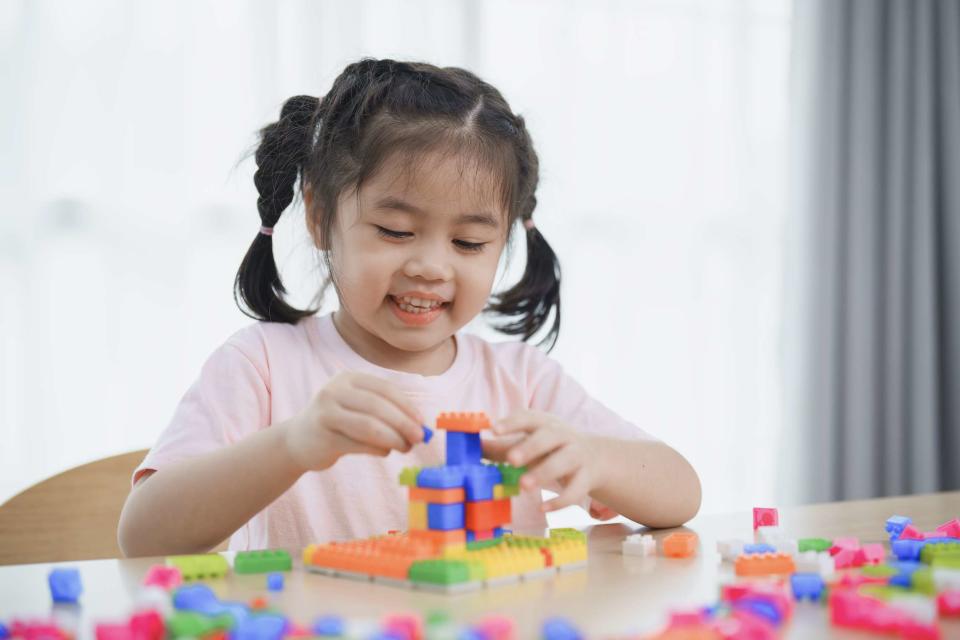Celebs Team Up With LEGO to Rebuild Kids' Relationship With Playtime
Statistics show children are losing unstructured playtime—experts explain why this is so important.

wombatzaa / Getty Images
Fact checked by Sarah Scott
Fashion designer and entrepreneur Tan France grew up as one of four children with two working parents. His parents could not spend hours carpooling France and his siblings from music lessons to soccer practice with math league in between. But there was plenty of time for play.
France explored the outside, gravitating towards flowers, which (in a portent of things to come) resulted in him designing floral wear that he sold to family and friends. Another favorite item to use for design? LEGO.
“We didn’t have access to a lot of toys,” France says. “LEGO is one of those things you can build one thousand things out of. What you can do with them is endless.”
Now a father of two himself, France has the means to sign his children up for all the things, but he doesn’t want them to miss out on those unstructured moments. “I don’t want to lose [play and imagination] because of who I am now,” France says. In fact, the time France spent playing and imagining served as a foundation for who he is now.
But statistics indicate many kids are losing unstructured playtime. According to a LEGO survey of more than 21,000 parents of children ages 6-12 conducted in August, the average child spends only 2% of their week playing. About one-third (32%) spend fewer than three hours per week enjoying play. According to LEGO data, 57% of parents reported the time their child spends on achievement-based activities like sports and academics has risen in the last three years, often replacing unstructured play.

The LEGO Group
Becoming a father and hearing these statistics inspired France to team up with celebrities, including Naomi Watanabe, Bindi Irwin, and Stephanie Beatriz, for a new campaign with LEGO called “Play is Your Superpower.” The campaign's goal, which includes a five-minute short film starring Jane Lynch, is to bring awareness to the benefits of play.
“Overall, play is crucial to a child's development, including physical and mental health and happiness,” says Andrew Monasterio, DNP, PMHNP, a psychiatric mental health nurse practitioner at Mindpath College Health, in Isla Vista, California.
One expert applauds the campaign, hoping that celebrity endorsements of unstructured play help curb statistics. “Celebrity endorsements can help if the public trusts the celebrity, especially if they have kids," says Regine Muradian, PsyD, a licensed clinical psychologist in California.
Dr. Muradian also stresses that unstructured play has short and long-term benefits. She and other professionals discuss those benefits, including how blocks and LEGO specifically are excellent tools for a parents’ proverbial toolbox and kids’ actual toybox.
Related: Toddlers Who Had Screen Time as Infants Experienced Developmental Delays, Study Shows
The Importance of Unscrutcured Play
One child therapist has also seen a trend of unstructured play falling lower on families’ priority lists.
“Open play is an often-overlooked element of child development, but it is so critical,” says Erica Miller, Ph.D., a clinical psychologist, children's therapist, and founder of Connected Minds NYC. “It fosters independence, emotion regulation, creativity, and social development. It can help them to build confidence and encourage them to be leaders and idea generators. Kids can take the lead without being led, which encourages leadership and power.”
A 2018 American Academy of Pediatrics (AAP) report noted that play could reduce stress, fatigue, injury, and depression while improving range of motion, balance, and coordination. Further, the AAP noted that giving children some control over their learning, which can be done through play, helps learning thrive.
“Children love to feel in control, and this is a great space to increase their spatial awareness, confidence, and self-esteem,” says Dr. Muradian. “Whether they are playing outdoors or creating play skits, kids always find a plethora of ideas to engage in.”
Dr. Monasterio—a fan of LEGO himself—says the classic toy (and other blocks) offer all of the above benefits. “LEGO and blocks are like brain-building superheroes,” he says. “When kids dive into a pile of LEGO, they're not just building castles and spaceships as they snap and stack. They're building neural connections, important skills, and so much more.”
“So much more” includes the sense of achievement parents want kids to feel when they sign them up for piano or team sports.
“When a child completes a LEGO masterpiece or a towering block structure... it boosts their self-esteem and confidence,” Dr. Monasterio adds. “They learn that with effort and creativity, they can achieve remarkable things.”
Unstructured Play vs. Achievement-Based Activities
A child may “play basketball,” but it's different from unstructured time with blocks or the great outdoors. “Unstructured play gives children the space to be creative without specific rules to follow,” Dr. Muradian says.
To be clear, none of the experts Parents spoke to—or France–are discouraging caregivers from signing their kids up for clubs, sports, and music lessons. All of those activities keep children engaged and can aid in development, too.
However, Dr. Monasterio says he fears caregivers—often unintentionally—fill a child’s day with structured activities with the hopes of helping them “do better” in school or lay the foundation for getting into a “good” college. The well-intentioned plans can limit unstructured play and actually miss the forest for the trees.
“It's not just about growing up smart,” Dr. Monasterio says. “it's also about growing up happy and healthy. While achievement-based activities are excellent, going all-in on them can sometimes lead to hiccups.”
Dr. Monasterio sees these hiccups daily when he works with youth and college students. “These students often have high expectations for themselves and feel pressure to succeed,” he says. “They may also have difficulty coping with failure. This can lead to anxiety, depression, and burnout.”
For what it's worth, a 2021 review of play habits during the pandemic indicated that play affected children’s emotional well-being and mood.

Matt Winkelmeyer / Getty Images
Ultimately, France encourages parents to find balance—something he’s trying to do with his toddler, who does participate in a Little Gym-style class. His children have nap and meal times, too. Outside of that? France gives them ownership of how they spend their time. Park? Garden? LEGO? Reading? It’s choose-your-own-adventure in his house.
“We want to give them the freedom during the time they have to decide what they want to do,” France says. “We think that’s healthy.”
Dr. Miller agrees that tuning into a specific child's needs is important as families try to balance structured and unstructured play. “Know your child,” Dr. Miller says. “Some kids find joy in [achievement-based] activities and place a lot of emphasis on achievement or the end product. It can still be important to give the opportunity to practice and to engage in activities without it being tied to tangible success or product.”
Ultimately, France hopes the “Play is Your Superpower” campaign helps families see there’s a time and a place for many types of activities.
“Without play, I wouldn’t be who I am today,” France says. “I’m really hoping people see that play can lead to something incredible for your kids. It’s not necessarily that they are going to be an entertainer…but it can help you think differently when you are solving any problem. Your imagination can do things that academia can’t possibly achieve.”
Related: The Ultimate Guide to Legoland New York
For more Parents news, make sure to sign up for our newsletter!
Read the original article on Parents.

